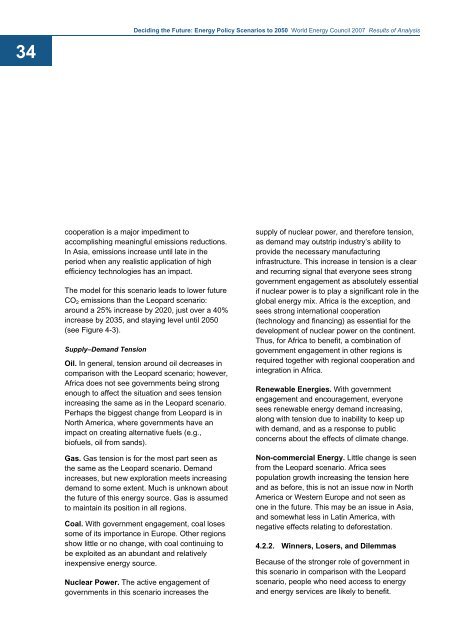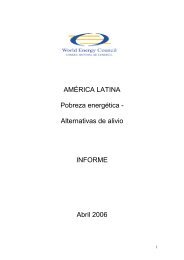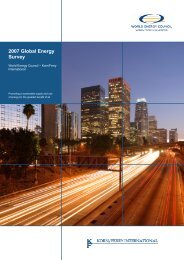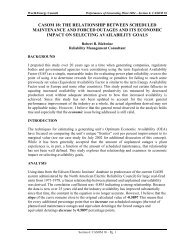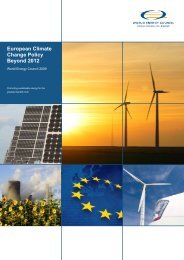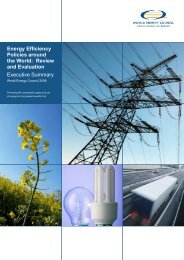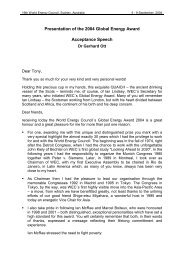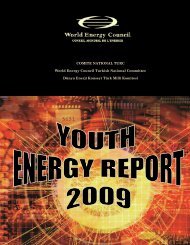Deciding the Future: Energy Policy Scenarios to 2050
Deciding the Future: Energy Policy Scenarios to 2050
Deciding the Future: Energy Policy Scenarios to 2050
Create successful ePaper yourself
Turn your PDF publications into a flip-book with our unique Google optimized e-Paper software.
34<br />
<strong>Deciding</strong> <strong>the</strong> <strong>Future</strong>: <strong>Energy</strong> <strong>Policy</strong> <strong>Scenarios</strong> <strong>to</strong> <strong>2050</strong> World <strong>Energy</strong> Council 2007 Results of Analysis<br />
cooperation is a major impediment <strong>to</strong><br />
accomplishing meaningful emissions reductions.<br />
In Asia, emissions increase until late in <strong>the</strong><br />
period when any realistic application of high<br />
efficiency technologies has an impact.<br />
The model for this scenario leads <strong>to</strong> lower future<br />
CO 2 emissions than <strong>the</strong> Leopard scenario:<br />
around a 25% increase by 2020, just over a 40%<br />
increase by 2035, and staying level until <strong>2050</strong><br />
(see Figure 4-3).<br />
Supply–Demand Tension<br />
Oil. In general, tension around oil decreases in<br />
comparison with <strong>the</strong> Leopard scenario; however,<br />
Africa does not see governments being strong<br />
enough <strong>to</strong> affect <strong>the</strong> situation and sees tension<br />
increasing <strong>the</strong> same as in <strong>the</strong> Leopard scenario.<br />
Perhaps <strong>the</strong> biggest change from Leopard is in<br />
North America, where governments have an<br />
impact on creating alternative fuels (e.g.,<br />
biofuels, oil from sands).<br />
Gas. Gas tension is for <strong>the</strong> most part seen as<br />
<strong>the</strong> same as <strong>the</strong> Leopard scenario. Demand<br />
increases, but new exploration meets increasing<br />
demand <strong>to</strong> some extent. Much is unknown about<br />
<strong>the</strong> future of this energy source. Gas is assumed<br />
<strong>to</strong> maintain its position in all regions.<br />
Coal. With government engagement, coal loses<br />
some of its importance in Europe. O<strong>the</strong>r regions<br />
show little or no change, with coal continuing <strong>to</strong><br />
be exploited as an abundant and relatively<br />
inexpensive energy source.<br />
Nuclear Power. The active engagement of<br />
governments in this scenario increases <strong>the</strong><br />
supply of nuclear power, and <strong>the</strong>refore tension,<br />
as demand may outstrip industry’s ability <strong>to</strong><br />
provide <strong>the</strong> necessary manufacturing<br />
infrastructure. This increase in tension is a clear<br />
and recurring signal that everyone sees strong<br />
government engagement as absolutely essential<br />
if nuclear power is <strong>to</strong> play a significant role in <strong>the</strong><br />
global energy mix. Africa is <strong>the</strong> exception, and<br />
sees strong international cooperation<br />
(technology and financing) as essential for <strong>the</strong><br />
development of nuclear power on <strong>the</strong> continent.<br />
Thus, for Africa <strong>to</strong> benefit, a combination of<br />
government engagement in o<strong>the</strong>r regions is<br />
required <strong>to</strong>ge<strong>the</strong>r with regional cooperation and<br />
integration in Africa.<br />
Renewable Energies. With government<br />
engagement and encouragement, everyone<br />
sees renewable energy demand increasing,<br />
along with tension due <strong>to</strong> inability <strong>to</strong> keep up<br />
with demand, and as a response <strong>to</strong> public<br />
concerns about <strong>the</strong> effects of climate change.<br />
Non-commercial <strong>Energy</strong>. Little change is seen<br />
from <strong>the</strong> Leopard scenario. Africa sees<br />
population growth increasing <strong>the</strong> tension here<br />
and as before, this is not an issue now in North<br />
America or Western Europe and not seen as<br />
one in <strong>the</strong> future. This may be an issue in Asia,<br />
and somewhat less in Latin America, with<br />
negative effects relating <strong>to</strong> deforestation.<br />
4.2.2. Winners, Losers, and Dilemmas<br />
Because of <strong>the</strong> stronger role of government in<br />
this scenario in comparison with <strong>the</strong> Leopard<br />
scenario, people who need access <strong>to</strong> energy<br />
and energy services are likely <strong>to</strong> benefit.


